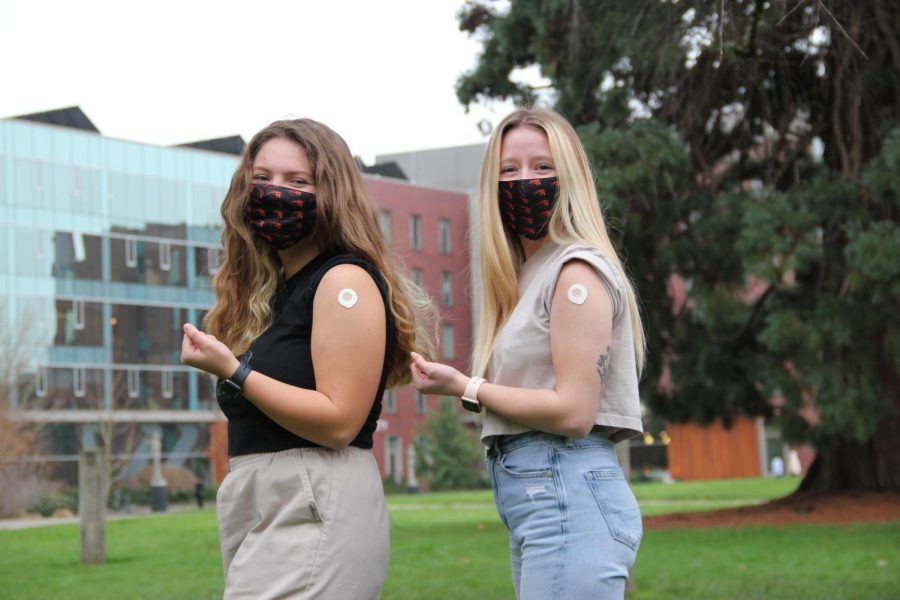Oregon approaches omicron hospitalization peak, local health experts advise vaccination
Oregon State University first-year students Citlally Martin (left) and Love Fraijo-Meschelle display their bandages from receiving their COVID-19 booster shot. Omicron hospitalizations are expected to peak in Oregon this week while case counts remain high, and local health experts are continuing to advise vaccination.
February 1, 2022
As COVID-19 cases surge throughout Oregon, Corvallis residents are lining up to get booster shots, and local health officials continue to encourage vaccination as the omicron peak continues.
Oregon Health & Science University is predicting Oregon omicron hospitalizations will peak this week, with 1,220 projected to be in hospitals with the variant by Feb. 6. Case counts and test positivity are remaining at high levels, with some regions of the state beginning to crest. In an effort to continue staying safe through this peak, health officials advise being up to date with COVID-19 vaccines.
According to the Oregon Health Authority’s COVID-19 Breakthrough Report, published on Jan. 27, 71.2% of the 57,011 reported cases in Oregon during the week of Jan. 16-22 were unvaccinated cases, and 28.8% were vaccinated cases.
“Based on hospital data, the majority of people still are unvaccinated,” said Dr. Gaurav Sahay, an associate professor in the College of Pharmacy at Oregon State University. “The good news is that with omicron, the vaccinated are protected and you won’t get severely ill if you catch it.”
OHA’s COVID-19 Breakthrough Report includes data that suggests a person is less likely to contract COVID-19 with the Pfizer and Moderna vaccines than they are with the Johnson & Johnson vaccine.
“Recently the [Centers for Disease Control and Prevention] said there’s a preference for mRNA—Pfizer and Moderna—COVID-19 vaccines over the Johnson & Johnson vaccine because of increased effectiveness and rare side effects associated with the Johnson & Johnson vaccines,” said April Holland, the Benton County public health director and administrator.
Although the CDC says it’s best to receive either the Pfizer or Moderna vaccine, Holland said being vaccinated by any of the three widely available vaccines in the U.S. is better than not being vaccinated at all.
“COVID-19 vaccines are effective at protecting people and help keep people from getting seriously sick,” Holland said. “COVID-19 vaccines can reduce the risk of people spreading the virus that causes COVID-19.”
In Benton County, there were 284 new cases on Jan. 31, with 21 currently being hospitalized due to the virus.
Macarena Diáz Astudillo, visiting graduate researcher at OSU, got COVID-19 while traveling to New York over the holidays with her partner. She is fully vaccinated and received her Pfizer booster on Oct. 7, 2021.
“I was so confident about the vaccine,” Diáz Astudillo said. “I thought that if we were careful enough, and since we were both boosted, that there was a chance I wouldn’t get it.”
Diáz Astudillo said she felt lucky because although both she and her partner got COVID-19, their symptoms were mild and felt like nothing more than a quick cold. She said she is happy she received the booster shot prior to getting sick and believes that it helped protect her against the virus.
Holland said the COVID-19 booster shot is very effective against preventing serious illness from the virus.
“Booster doses are essential in slowing the spread of the virus and protecting people from hospitalization and death,” Holland said. “Although we don’t have all the answers on the new omicron variant—which is highly transmissible—initial data suggests that COVID-19 boosters help broaden and strengthen protection against omicron, delta and other variants.”
In an effort to curtail the COVID-19 pandemic, which will begin its third year in March, and all the negative impacts associated with it, health professionals urge citizens to do their part and get vaccinated.
Getting vaccinated, Sahay said, is the best way we know how to reduce the spread of infection.
“The virus will keep on mutating, and we don’t want the virus to mutate to a level that the vaccines become good for nothing,” Sahay said.
The COVID-19 virus chooses to inhabit people among the unvaccinated population as it is easier to survive in people who have not received the vaccine and built up sufficient antibodies, Sahay said. Once the virus infects unvaccinated people, it has the ability to mutate and lead to new strains of the virus.
Sahay reiterated that the best chance we have for breaking out of this pandemic is a widespread increase in COVID-19 vaccinations.
“I know it has been a tough time for everyone, but I think collectively, we’ll have to try to get out of this,” Sahay said.










































































































